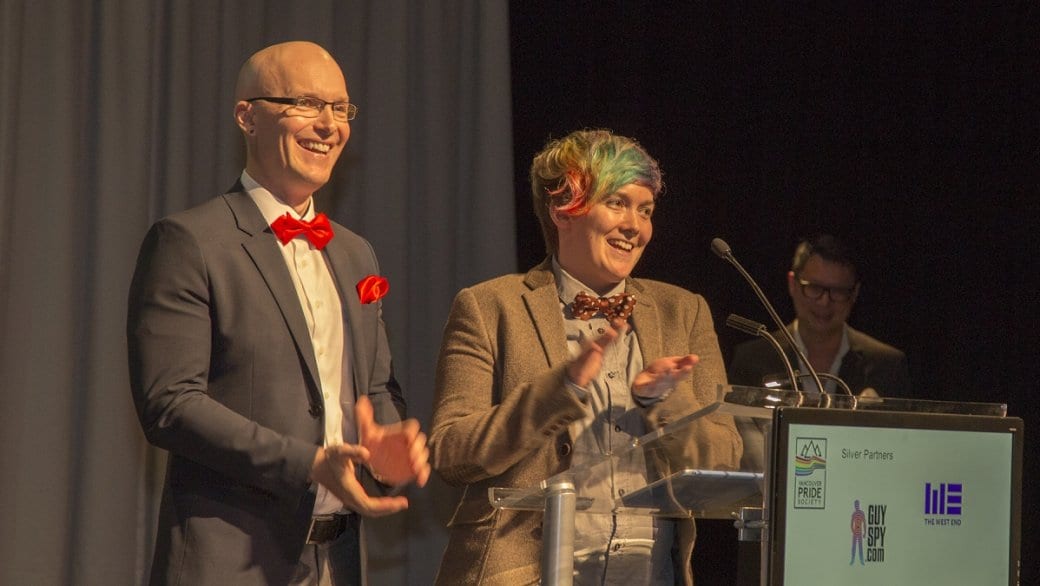Two former directors of the Vancouver Pride Society are calling for police to voluntarily step out of the 2017 parade, just days before the VPS plans to announce its long-awaited decision on the matter.
In a letter emailed to Mayor Gregor Robertson and police Chief Constable Adam Palmer, a former president and vice-president of Pride’s directorial board say “police involvement in the Vancouver Pride parade has created significant division both within the community and between the community and law enforcement” and heightened anti-black racism against members of the queer community.
“While serving with the VPS we heard from members of the LGBTQ2S community in Vancouver that the police presence in the parade was a barrier to their participation,” write Tim Richards and Chrissy Taylor in their letter dated May 11, 2017.
“In 2013/2014 the VPS held talks with members of the trans community. We heard accounts from people who did not want to participate because of the police involvement in the parade,” they continue. “Members of the black queer community are asking to create a space that allows them to be included in Pride.”
A spokesperson for the mayor told Xtra by email that Robertson will comment when the VPS announces its final decision, expected next week.
Sergeant Randy Fincham, speaking on behalf of Palmer and the Vancouver Police Department, says the decision is up to the Pride Society and says he has nothing further to add.
Taylor and Richards served respectively as vice-president and president of the VPS from 2012–2016. Taylor says they wanted to offer their input now, in time to encourage the police to voluntarily withdraw.
“Since the Black Lives Matter petition came out this year, and especially since the increase of the anti-black racism came out after the counter-petition, we thought it’s a crucial time now, before there has been an official decision,” Taylor says. “We wanted to give our input to the police to hopefully make a decision to take a step back.”
Richards says police withdrawing could be seen as an opportunity to reassess their engagement, rather than as a step back.
“It provides an opportunity for more dialogue. It’s a step to build some trust and I think it would be a great first step to show trust and willingness to listen and understand what the issues are and then start to build plans to make things better,” he says.
Taylor acknowledges that many members of the queer community see police in the parade as a symbol of progress, but says many trans people and people of colour say their voices are erased if police are included.
“When someone is seeing a problem with that, you really need to listen and reflect on what is being said,” Taylor says, “and in the policing situation, that’s potentially making it less possible for queer people to access Pride.”
“You can’t necessarily call yourself an ally; that’s for someone else to do,” Taylor says.
The timing of their letter has ruffled feathers at the Vancouver Pride Society, which is planning to announce its final decision next week on police involvement in the parade.
VPS board co-chair Michelle Fortin questions why Richards and Taylor are acknowledging feedback they received from the community in 2013 and 2014 now, when they had opportunity to take action at the time.
“It’s curious to read about the recognition that leadership at Pride have experienced this feedback from the community and yet when Chrissy and Tim were in leadership, things were status quo and the police footprint was bigger,” she alleges.
Fortin says she is disappointed that Richards, who remains on the parade working group, and Taylor, who participated in this year’s community consultations, would leverage positions they no longer hold with Pride to pre-empt the careful planning going into the coming announcement on police presence.
“When you’re on a current board and past board members start leveraging that relationship without speaking to you, that’s a real struggle,” Fortin says. “I run a non-profit and if a former board member were to speak on behalf of my current board chair, that would be just incredibly disrespectful. It’s disheartening to put us in this position when we’re five days away from an announcement, when you’re really proud of the work and you really care about the community.”
Fortin says the VPS announcement will acknowledge that members of the police are queer and that many types of groups walk in the parade — but not necessarily in uniform.
“The reality is, and police know, there is lots of work to do, but suffice it to say that where we’re moving to is a recognition that police and their place in our community is valuable, and that the power they carry is sometimes not experienced positively,” Fortin says.

 Why you can trust Xtra
Why you can trust Xtra


